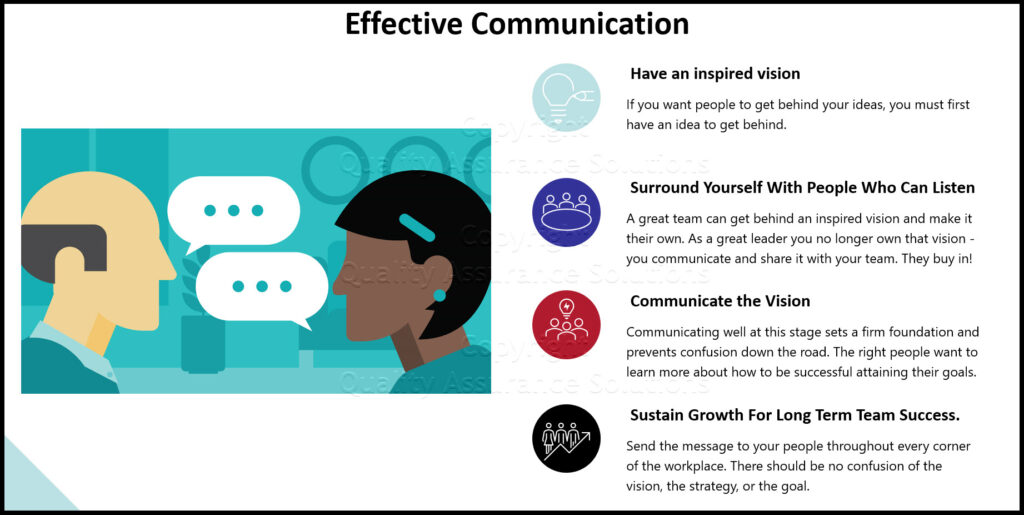
Small Business Leadership: How Owners can be Effective Leaders
Small business owners play a vital role in the success of their companies. More than just managing overall operations, owners can motivate employees for greater productivity and generate more revenue through small business leadership.
The typical small business owner is responsible for every aspect of the company, from hiring and retaining talent to ensuring teams adhere to budgets. But one of the major responsibilities of a small business owner is leadership. Creating a positive work environment encourages and motivates workers to strive for excellence (79% of workers will quit if their bosses don’t show adequate appreciation). Even more so, small business leadership helps establish a company that is an industry pacesetter that attracts customers and helps to grow distribution.
Keep reading to learn how small business owners can also be effective leaders.
Key Takeaways
- Leadership is about motivating people to help move projects forward to achieve a common goal.
- From accountability to resiliency, great leaders possess qualities that set them apart.
- Ongoing education, practicing your skills and making incremental improvements help you succeed in small business leadership.
What Makes a Great Leader?
A good business owner makes wise decisions about how to manage and operate their magazine printing or newspaper printing company. They think of ways to increase advertising revenue and grow page count. They investigate ways to lower the cost of doing business and develop unique ideas to grow small newspaper revenue. A good leader will motivate and inspire people to help them achieve these goals.
The following video outlines what makes a great leader and how effective leaders inspire people to help them co-create the future:
Leadership is all about moving projects and people forward to meet certain objectives. Great leaders have people skills that enable them to create goal-oriented workers who have a sense of duty and desire to want to do well. People in successful small business leadership roles possess special qualities and traits that help set them apart. Here are three such traits.
1. Accountability
Leaders need to hold their teams accountable for their work, and they need to hold themselves accountable for the decisions they make and actions they take. They must accept responsibility, both in good times and in bad, for whatever outcome may develop. A good leader doesn’t point fingers and pass blame if they fall short of planned goals. Instead, they assess the situation and devise possible solutions to get things back on track.
2. Effective Communication
Strong leaders can clearly express their objectives, plans, and ideas in a way that elicits buy-in from the group. They also maintain open channels of communication, so people feel welcome to share ideas and address issues. Open communication gives people the feeling of teamwork and helps employees feel valued, appreciated, and respected.

3. Resiliency
Despite best efforts, things don’t always go according to plan. Minor setbacks can derail a team’s plans and lead to feelings of discouragement. A strong leader is resilient in the face of adversity and doesn’t let a slight mishap destroy an entire plan. Instead, they look at the situation from several perspectives, identify what went wrong, and consider possible ways to recover.

3 Ways to Succeed in Small Business Leadership
While there may be some overlap, the role of a small business owner and a small business leader are two different things. By learning to become a strong leader, you can improve how you operate and run your business. Here are three ways to succeed in small business leadership.
Step 1: Continue to Learn
In leadership, it’s important to realize that the people who follow you constantly adapt and evolve. As such, so should you. Strong leaders constantly work to improve their skills, mindset, and approach. Take educational classes. Read books written by industry and leadership experts. Ask your team for feedback and ways you can more effectively help guide them in their role. Not only will you better yourself, but you’ll also set a good example for others that ongoing education is a positive thing.
Adaptability and continual growth can help you build stronger relationships with your team members. You can see more engagement among your co-workers, but you’ll also see an increase in productivity and sales, as your improved leadership skills are sure to boost performance and success rates.
Step 2: Practice Leadership Skills
It’s true what they say. Practice makes perfect. The best way to hone your leadership skills is to constantly put them into practice. Take advantage of the following opportunities to focus on your leadership characteristics and constantly improve your methods:
- Provide motivational pep talks at daily huddles and monthly team meetings
- Instill an open-door policy where people feel welcome to hold impromptu one-on-one meetings
- Give public praise when warranted with pats on the back and company-wide kudos
- Show constant appreciation for your teams and the work they put in to help your company reach its goals
Not only will workers appreciate these efforts, but they’ll also respond to them positively with a drive for excellence and commitment to a job well done.
Step 3: Work on Incremental Improvements
You may not be able to master small business leadership all at once, but you can certainly tackle it one step at a time. The more motivational talks you give, the more proficient you’ll be. The more words of praise you give to your teams, the better they’ll respond to your requests. By focusing on one element of leadership for small business owners at a time, you’ll be able to gain a better mastery of these important skills.
Ways to work on incremental improvements include:
- Mentor someone who shows leadership promise
- Record yourself delivering motivational pep talks to improve your impact
- Emulate a leader you admire
- Join an industry association and seek a leadership role there
Working on leadership skills in small increments allows you to focus your efforts more directly. As a result, you can gain mastery of each skill before moving on to the next. Incrementally increasing your leadership skills helps you to become a strong example of small business leadership.
Succeed at Small Business Leadership
BOOM Communications delivers advertising and marketing solutions that help drive traffic, boost conversions, and generate more revenue for your small business.
Contact BOOM Communications today to learn how we can help you succeed in small business leadership.
